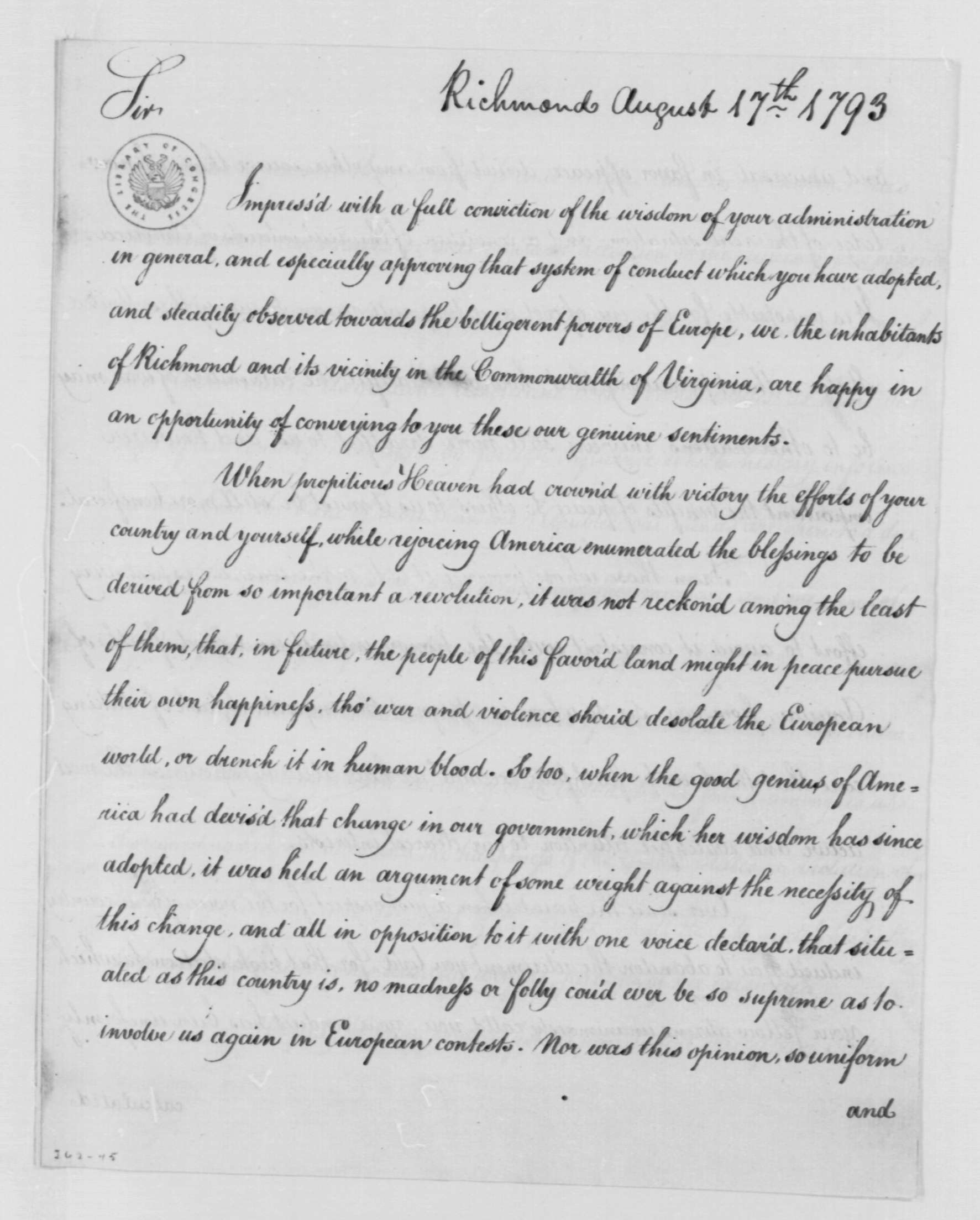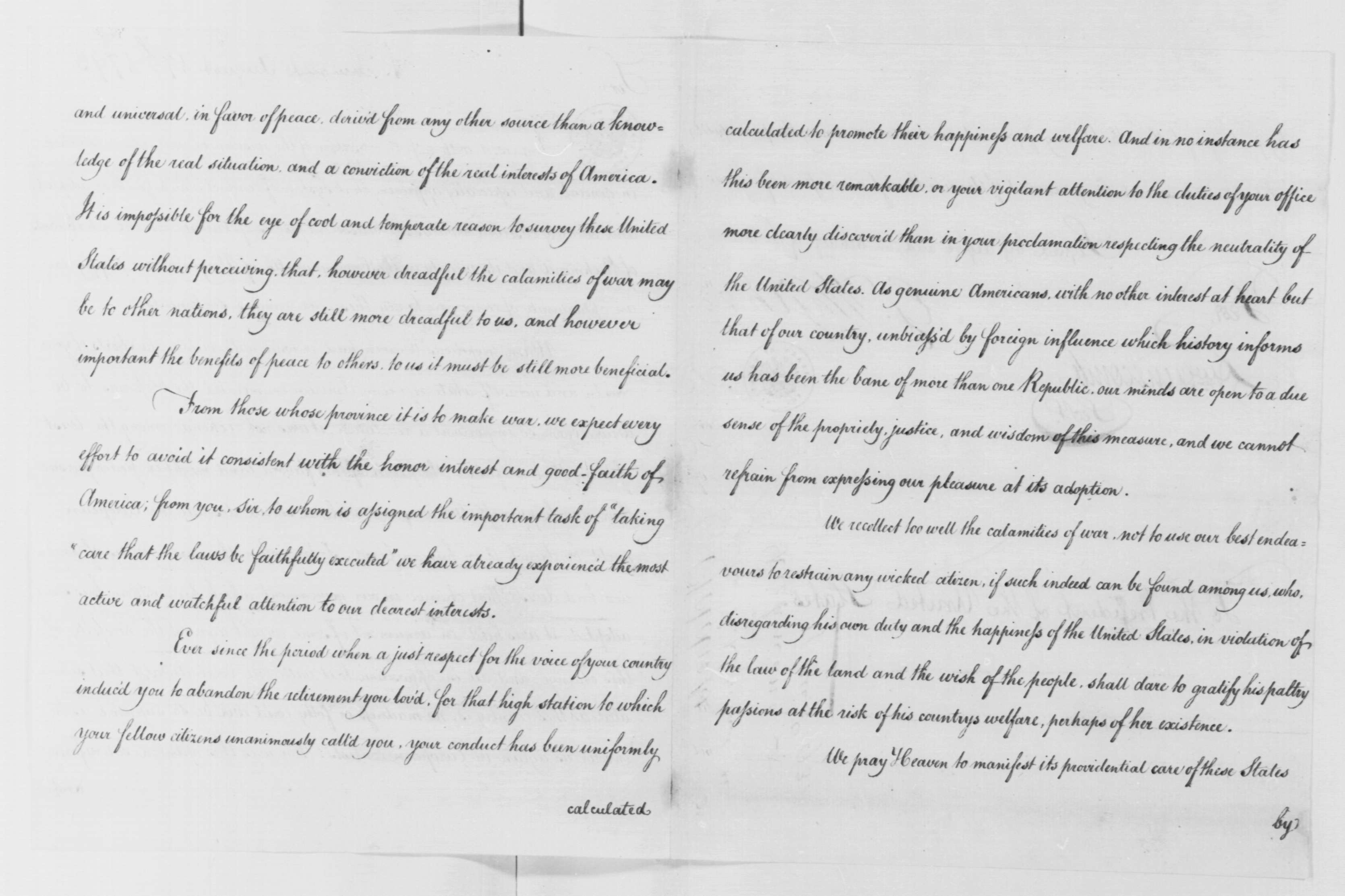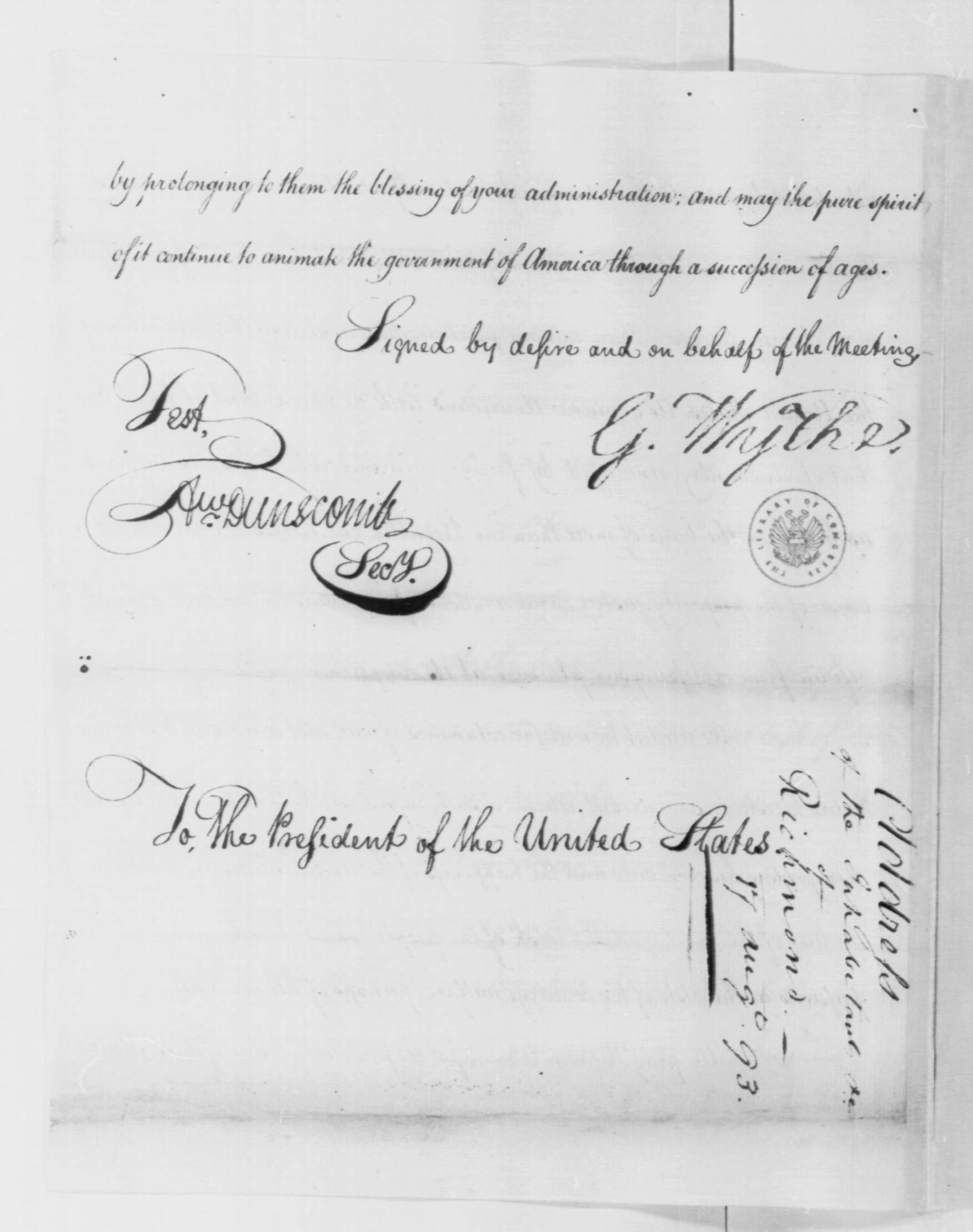Difference between revisions of "Address of the Inhabitants of Richmond"
m |
m |
||
| (14 intermediate revisions by the same user not shown) | |||
| Line 1: | Line 1: | ||
| − | [[File:AddressOfTheInhabitantsofRichmond17August1793P1.jpg|thumb|right|450px|Page one of the "Address of the Inhabitants of Richmond," dated August 17, 1793.]] | + | [[File:AddressOfTheInhabitantsofRichmond17August1793P1.jpg|thumb|right|450px|Page one of the "Address of the Inhabitants of Richmond," dated August 17, 1793. Original in the [https://www.loc.gov/resource/mgw4.104_0296_0298/?sp=1 George Washington Papers,] Series 4, General Correspondence, Library of Congress, Washington, D.C.]] |
| − | An address to George Washington, President of the United States, from a public meeting of the citizens of Richmond, Virginia, presided over by [[George Wythe]].<ref>''The Papers of George Washington,'' Presidential Series, vol. 13, ''1 Jun.-31 August 1793,'' ed. Christine Sternberg Patrick (Charlottesville, VA: University of Virginia Press, 2007), 481-482.</ref> The address was composed by a committee | + | An address to George Washington, President of the United States, from a public meeting of the citizens of Richmond, Virginia, presided over by [[George Wythe]].<ref>''The Papers of George Washington,'' Presidential Series, vol. 13, ''1 Jun.-31 August 1793,'' ed. Christine Sternberg Patrick (Charlottesville, VA: University of Virginia Press, 2007), 481-482.</ref> The address was composed by a committee composed of [[John Marshall]], Carter Braxton, Archibald Campbell, Dr. James McClurg, Andrew Ronald, and John Steele. The document is signed by Wythe "by desire and on behalf of the Meeting," but is in the hand of one of Wythe's clerks in the High Court of Chancery, Andrew Dunscomb, who signs as secretary.<ref>Dunscomb later served as mayor of Richmond, from 1795-1796. See Harrison Dwight Cavanagh, [https://books.google.com/books?id=lzaSAwAAQBAJ&pg=PA57 ''Colonial Chesapeake Families: British Origins and Descendants,''] vol. 2 (Xlibris, 2014), 57.</ref> |
| + | |||
| + | The meeting was a result of interference by the French minister to the United States, [[wikipedia:Edmond-Charles Genêt|Edmond-Charles Genêt]], who was attempting to gain public and financial support in America for France's wars with Spain and Britain. The address praises the work of President Washington in keeping the United States neutral in international affairs. Washington [https://founders.archives.gov/documents/Washington/05-13-02-0382 responded on August 28, 1793.]<ref>[https://founders.archives.gov/documents/Washington/05-13-02-0382 "From George Washington to the Citizens of Richmond, Virginia, 28 August 1793,"] Founders Online, National Archives.</ref> | ||
==Document text, 17 August 1793== | ==Document text, 17 August 1793== | ||
| Line 17: | Line 19: | ||
===Page 2=== | ===Page 2=== | ||
| − | [[File:AddressOfTheInhabitantsofRichmond17August1793P2-3.jpg|thumb|right|450px|Pages two and three of the "Address of the Inhabitants of Richmond."]] | + | [[File:AddressOfTheInhabitantsofRichmond17August1793P2-3.jpg|thumb|right|450px|Pages two and three of the "Address of the Inhabitants of Richmond." Original in the [https://www.loc.gov/resource/mgw4.104_0296_0298/?sp=2 George Washington Papers,] Library of Congress.]] |
| − | [[File:AddressOfTheInhabitantsofRichmond17August1793P4.jpg|thumb|right|450px|Page four of the "Address of the Inhabitants of Richmond," signed by [[George Wythe]].]] | + | [[File:AddressOfTheInhabitantsofRichmond17August1793P4.jpg|thumb|right|450px|Page four of the "Address of the Inhabitants of Richmond," signed by [[George Wythe]]. Original in the [https://www.loc.gov/resource/mgw4.104_0296_0298/?sp=3 George Washington Papers,] Library of Congress.]] |
<blockquote> | <blockquote> | ||
and universal, in favor of peace, deriv'd from any other source than a knowledge of the real situation, and a conviction of the real interests of America. It is impossible for the eye of cool and temperate reason to survey these United States without perceiving, that, however dreadful the calamities of war may be to other nations, they are still more dreadful to us, and however important the benefits of peace to others, to us it must be still more beneficial. | and universal, in favor of peace, deriv'd from any other source than a knowledge of the real situation, and a conviction of the real interests of America. It is impossible for the eye of cool and temperate reason to survey these United States without perceiving, that, however dreadful the calamities of war may be to other nations, they are still more dreadful to us, and however important the benefits of peace to others, to us it must be still more beneficial. | ||
| Line 48: | Line 50: | ||
::A<sup>w</sup>. Dunscomb, Sec<sup>y</sup>. | ::A<sup>w</sup>. Dunscomb, Sec<sup>y</sup>. | ||
| + | :To The President of the United States | ||
| − | + | <br /> | |
| − | |||
| − | |||
| − | |||
Address<br /> | Address<br /> | ||
of the Inhabitants of<br /> | of the Inhabitants of<br /> | ||
| Line 58: | Line 58: | ||
17 Aug<sup>t</sup>. 93 | 17 Aug<sup>t</sup>. 93 | ||
</blockquote> | </blockquote> | ||
| + | |||
| + | ==See also== | ||
| + | |||
| + | *[[George Washington to Wythe, 28 August 1793]] | ||
| + | *[[Resolutions, 17 August 1793]] | ||
| + | *[[Thomas Jefferson to Wythe, 1 September 1793]] | ||
| + | *[[Wythe to Thomas Jefferson and Edmund Randolph, 17 August 1793]] | ||
==References== | ==References== | ||
<references /> | <references /> | ||
| + | |||
| + | ==External links== | ||
| + | *[https://founders.archives.gov/documents/Washington/05-13-02-0382 "From George Washington to the Citizens of Richmond, Virginia, 28 August 1793,"] Founders Online, National Archives. | ||
[[Category: Letters and Papers]] | [[Category: Letters and Papers]] | ||
Latest revision as of 09:37, 28 August 2024

An address to George Washington, President of the United States, from a public meeting of the citizens of Richmond, Virginia, presided over by George Wythe.[1] The address was composed by a committee composed of John Marshall, Carter Braxton, Archibald Campbell, Dr. James McClurg, Andrew Ronald, and John Steele. The document is signed by Wythe "by desire and on behalf of the Meeting," but is in the hand of one of Wythe's clerks in the High Court of Chancery, Andrew Dunscomb, who signs as secretary.[2]
The meeting was a result of interference by the French minister to the United States, Edmond-Charles Genêt, who was attempting to gain public and financial support in America for France's wars with Spain and Britain. The address praises the work of President Washington in keeping the United States neutral in international affairs. Washington responded on August 28, 1793.[3]
Contents
Document text, 17 August 1793
Page 1
Richmond August 17th. 1793
Sir
Impress'd with a full conviction of the wisdom of your administration in general, and especially approving that system of conduct which you have adopted, and steadily observed towards the belligerent powers of Europe, we, the inhabitants of Richmond and its vicinity in the Commonwealth of Virginia, are happy in an opportunity of conveying to you these our genuine sentiments.
When propitious Heaven had crown'd with victory the efforts of your country and yourself, while rejoicing America enumerated the blessings to be derived from so important a revolution, it was not reckon'd among the least of them, that, in future, the people of this favor'd land might in peace pursue their own happiness, tho' war and violence shou'd desolate the European world, or drench it in human blood. So too, when the good genius of America had devis'd that change in our government, which her wisdom has since adopted, it was held an argument of some weight against the necessity of this change, and all in opposition to it with one voice declar'd, that situated as this country is, no madness or folly cou'd ever be so supreme as to involve us again in European contests. Nor was this opinion, so uniform and
Page 2


and universal, in favor of peace, deriv'd from any other source than a knowledge of the real situation, and a conviction of the real interests of America. It is impossible for the eye of cool and temperate reason to survey these United States without perceiving, that, however dreadful the calamities of war may be to other nations, they are still more dreadful to us, and however important the benefits of peace to others, to us it must be still more beneficial.
From those whose province it is to make war, we expect every effort to avoid it consistent with the honor interest and goodfaith of America; from you, Sir, to whom is assigned the important task of "taking care that the laws be faithfully executed" we have already experienc'd the most active and watchful attention to our dearest interests.
Ever since the period when a just respect for the voice of your country induc'd you to abandon the retirement you lov'd, for that high station which your fellow citizens unanimously call'd you, your conduct has been uniformly calculated
Page 3
calculated to promote their happiness and welfare. And in no instance has this been more remarkable, or your vigilant attention to the duties of your office more clearly discover'd than in your proclamation respecting the neutrality of the United States. As genuine Americans, with no other interest at heart but that of our country, unbiass'd by foreign influence which history informs us has been the bane of more than one Republic, our minds are open to a due sense of the propriety, justice, and wisdom of this measure, and we cannot refrain from expressing our pleasure at its adoption.
We recollect too well the calamities of war, not to use our best endeavours to restrain any wicked citizen, if such indeed can be found among us, who, disregarding his own duty and the happiness of the United States, in violation of the law of the land and the wish of the people, shall dare to gratify his paltry passions at the risk of his countrys welfare, perhaps of her existence.
We pray Heaven to manifest its providential care of these States by
Page 4
by prolonging to them the blessing of your administration; And may the pure spirit of it continue to animate the government of America through a succession of ages.
- Signed by desire and on behalf of the Meeting,
- G. Wythe.
- Test.,
- Aw. Dunscomb, Secy.
- To The President of the United States
Address
of the Inhabitants of
Richmond.
17 Augt. 93
See also
- George Washington to Wythe, 28 August 1793
- Resolutions, 17 August 1793
- Thomas Jefferson to Wythe, 1 September 1793
- Wythe to Thomas Jefferson and Edmund Randolph, 17 August 1793
References
- ↑ The Papers of George Washington, Presidential Series, vol. 13, 1 Jun.-31 August 1793, ed. Christine Sternberg Patrick (Charlottesville, VA: University of Virginia Press, 2007), 481-482.
- ↑ Dunscomb later served as mayor of Richmond, from 1795-1796. See Harrison Dwight Cavanagh, Colonial Chesapeake Families: British Origins and Descendants, vol. 2 (Xlibris, 2014), 57.
- ↑ "From George Washington to the Citizens of Richmond, Virginia, 28 August 1793," Founders Online, National Archives.
External links
- "From George Washington to the Citizens of Richmond, Virginia, 28 August 1793," Founders Online, National Archives.